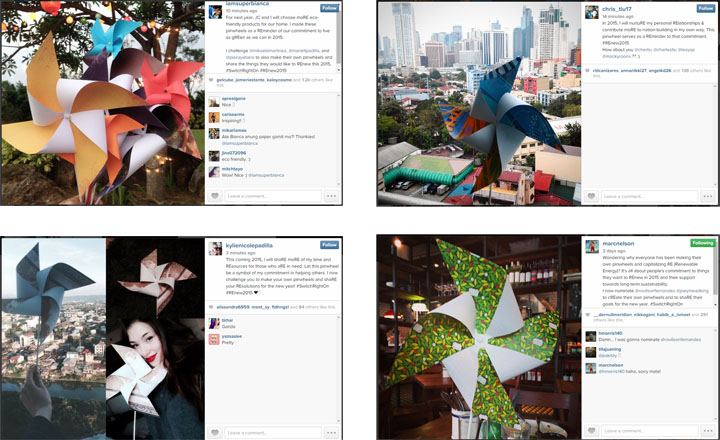RE Campaign Gains Ground Online as PH Renews Commitment to Sustainable Development
For the Philippines and its global partners, embracing renewable energy is turning right on to a future of sustainable progress.
International groups, government institutions, and local personalities expressed their support for renewable energy as a sound policy direction for the Philippines, as the country moves to promote energy security, self-sufficiency, and environmental protection. Such a show of overwhelming commitment proved to be a welcome development for the Philippines’ Switch Right On campaign, a multi-industry campaign geared towards promoting an increased use of renewable energy for environmental and economic sustainability. This initiative is being spearheaded by the collaborative efforts of the European Chamber of Commerce in the Philippines (ECCP), AIESEC Philippines, and other partners from various industries.
Among those who voiced their support for the movement were Ashoka, the largest network of social entrepreneurs worldwide; local celebrities like newlywed TV host Bianca Gonzalez, Kapuso actress Bella Padilla, Save the Children ambassadors and actors Mikael Daez and Kylie Padilla, TV host and World Wildlife Fund for Nature ambassador Marc Nelson, PBA player and Habitat for Humanity ambassador Chris Tiu, and the Philippine Volcanoes.
A brighter future ahead
Filipinos view renewable energy as the right way forward but one that needs stronger support from government and industry stakeholders.
Renewable energy is an unlimited, clean, free, and sustainable source of energy that—while may not completely replace other sources of energy—has become more viable and continues to be environmentally friendly. Recent figures show that the Philippines’ dependence on energy provided by fossil fuels—90% of which is being imported, according to Energy Secretary Carlos Jericho Petilla—has been the main reason why the country continues to bear the heavy burden of having one of the highest electricity costs in Asia. The prices of coal—an important fossil fuel that has been the primary energy source in Philippines for several decades—have more than doubled since 2010 and experts doesn’t see any indication of this slowing down.
Promoting a shift towards the use of renewable energy naturally becomes a first step in making logical solutions to address a host of other social issues. The world has reached an economic tipping point where an increase in cost of fossil fuels and the decrease in cost of renewable energy have made these alternative sources more practical.
From an environmental standpoint, wind, solar, and hydroelectric systems generate electricity with very little to no impact on the environment. While geothermal and biomass energy systems may emit some air pollutants, their total air emissions are generally much lower than those of the world’s current sources of energy, which are easily depleted and carry a very heavy cost, economically and environmentally speaking. Rapid urbanization and increase human activity have also overwhelmed our atmosphere with hazardous gases, causing extremely harmful effects on our health, the environment, and the global climate. The massive amount of pollution generated by fossil fuels, for example, have been linked to a variety of health problems—terminal respiratory, neurological, cardiac illnesses, and cancers—thus claiming the lives of millions of individuals every single day.
Promoting RE investments
As we speak, more than 3-out-of-10 Filipino households still remain without power, even as demand for energy in the country continues to increase by 7% every year. Renewable energy technologies provide additional energy, which helps ensure electricity for millions of households.
Aside from ensuring a more progressive economy and a healthier environment, RE producers also generate employment, as proven by more than 5 million jobs created by other RE providers around the world, according to a 2012 Greenpeace study. In the United States, for example, the wind energy industry alone provided full-time jobs to more than 75,000 individuals back in 2011. These employment opportunities include careers in manufacturing, project development, construction and turbine installation, operations and maintenance, transportation and logistics, and financial, legal, and consulting services.
To help promote and accelerate investments in renewable energy technologies, the government will be implementing the feed-in-tariff (FIT) system beginning January 2015. These are 20-year rates paid for electricity fed into the grid providing support for RE providers to generate clean energy.
The approved FIT rates—considered one of the cheapest in the world—will help minimize the continued rise in electricity costs while also ensuring the sustainable development of renewable energy technologies and facilities.
With all these being said, Switch Right On intends to urge Filipinos from all walks of life to move away from their passive attitude on the current status of energy generation and turn on to supporting renewable energy.
The movement aims to spread awareness on the current state of energy production and consumption and policy direction for the local power sector by using an image of the pinwheel—a recognized symbol to promote greater understanding about renewable energy as a sound policy direction for the Philippines for future generations.
To know more about the campaign and how you can help promote energy security, self-sufficiency, and environmental protection for the Philippines, visit www.switchrighton.com
RE Campaign Gains Ground Online as PH Renews Commitment to Sustainable Development






